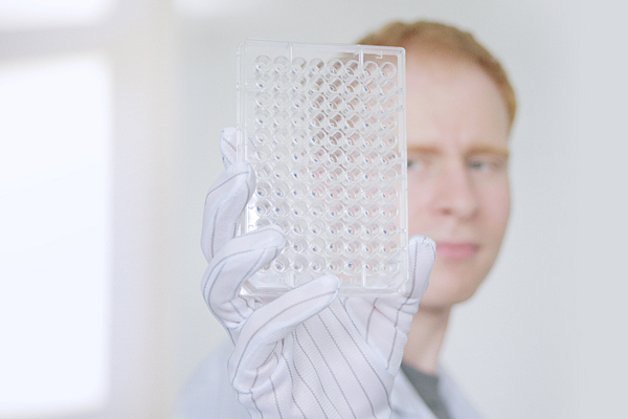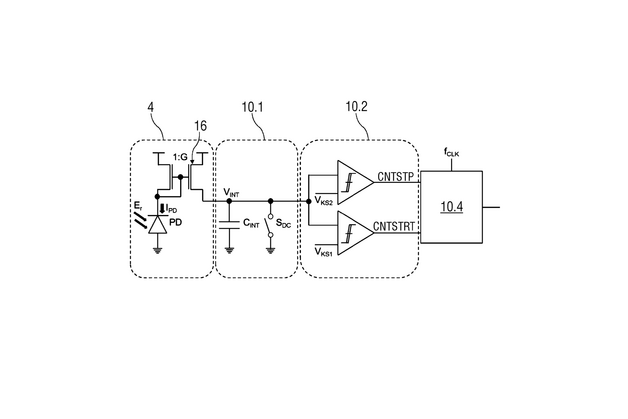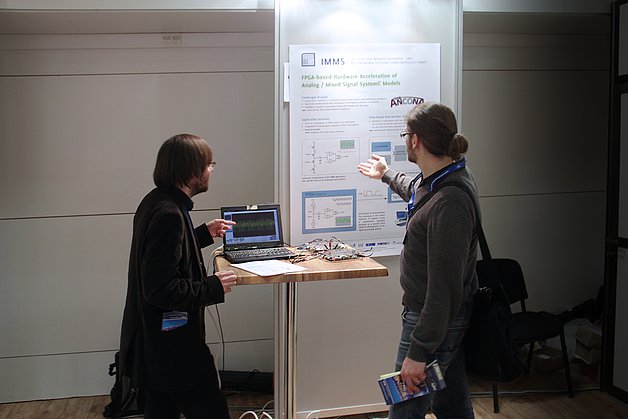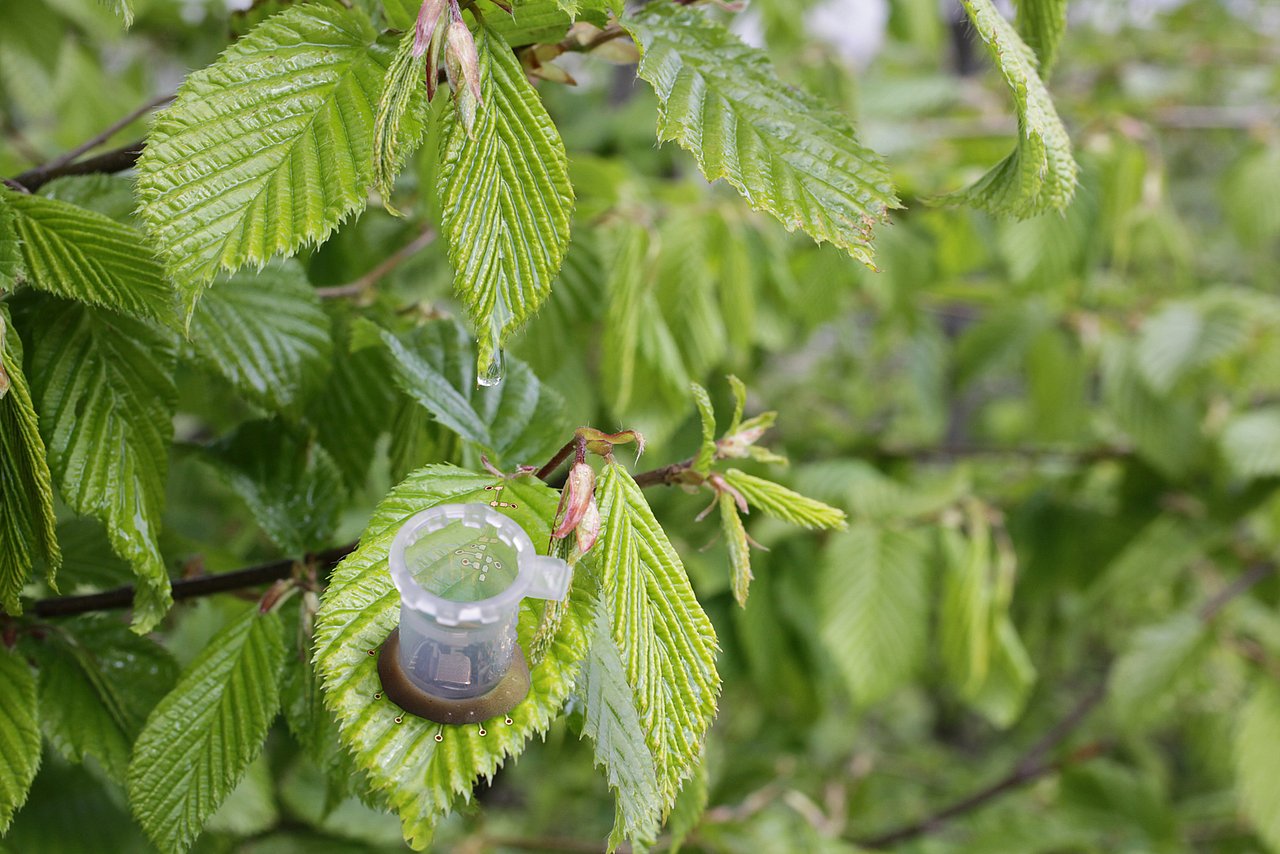Press releases
IMMS presents three developments at MEDICA 2017
Nov 13th – Nov 16th 2017, Düsseldorf (Germany), joint booth DiagnostikNet BB, hall 3/G60
8th November 2017. At the MEDCIA trade fair in Düsseldorf, Germany, IMMS will present a mobile microelectronic testing system for early cancer diagnosis, microelectronics for the analysis of aqueous solutions with the help of passive RFID sensors and a Bionic Vision System to compensate for blindness. Functional models and prototypes will illustrate the current state of research and development activities on bioanalysis carried out at IMMS. Furthermore, the Institute will introduce a chip development for medical technology which is part of Pixium Vision’s IRIS®II epi-retinal system presently being investigated in clinical studies.
Functional model for quantitative point-of-care cancer diagnosis with the help of microelectronics
There are certain types of cancer for which the patient’s doctor can test rapidly on the spot, obtaining an immediate result and thus resulting in saving cost and time-consuming lab tests. Present rapid tests are no more than qualitative and produce results confined to ”yes“ or ”no“. For colon and prostate cancer to be diagnosed at a very early stage, IMMS is developing microelectronics coming into direct contact with a sample and being capable of recognising concentrations of antigens in the range of one nanogram per cubic centimetre. Via live-demo of the functional model, IMMS will present the detection principle the current work is based on.
A passive RFID sensor prototype for the analysis of aqueous solutions
IMMS will demonstrate a passive RFID microelectronic chip with remote power supply. Placed into aqueous solutions, the chip measures temperature data which is captured and processed by an RFID reader unit. With this energy-efficient chip developed by IMMS, values are being measured and digitised with a power consumption of very few microwatts (approximately 3.5 microwatt). This would facilitate the use of a sensor operable without interruption for at least a 10-year period from a mignon battery with a typical capacity of 1000 mAh. Thanks to this ultra-low power consumption a battery is dispensable: an RFID reader unit generates an electromagnetic field which is sufficient to supply the passive RFID chip with power and to record and send data through containers and liquids over distance of up to four centimetres. The batteryless principle for RFID sensors which is introduced at the MEDICA is currently being transferred by IMMS to other measurands.
IRIS®II – epi-retinal system of Pixium Vision to compensate for blindness
IMMS has developed a biocompatible microelectronic chip as part of a retinal implant system with which people who have lost their sight from retinitis pigmentosa but with an intact optic nerve are learning to partially see again. A camera integrated into the spectacles records images of the environment which are transferred through the pupil to the retinal implant. There, the IMMS chip converts the optical information into an electronic data stream which is passed to the retina stimulator for the excitation of the optic nerve cells to elicit visual perception in the brain. The patients of the IRIS®II European clinical trial are currently learning to interpret the new perception in their re-education program. At the MEDICA, IMMS will present the system with which those patients are being equipped and video examples from on the study with patients' experiences.
IMMS is connecting microelectronics and life sciences for diagnostic systems
IMMS’ life science focus is the research and development of application-specific integrated electronic circuits (ASICs) and sensor systems for quantitative rapid tests and in-vitro diagnosis and for the monitoring of therapeutic progress. The novel systems bring closer a future of point-of-care testing for, among other things, early cancer diagnosis, which is fast, reliable, cheap and largely automated. IMMS therefore builds upon its multi-parameter microelectronics-based platforms and harnesses off-the-shelf, reasonably priced fabrication techniques and CMOS technology, incorporating them into innovative diagnostic systems. One important research focus of IMMS is the integration of a variety of detection principles into a single electronic sensor chip which can be used to measure biological and chemical features. IMMS works in close conjunction with its life science partners to match the systems to their application, for instance by providing interfaces that are made of biocompatible materials or by accommodating the packaging.
IMMS pools expertise for life science applications of its partners
IMMS works on solutions for harsh conditions and for high-precision applications. It develops energy-efficient, robust and biocompatible electronic sensor and actuator systems. Such systems are able, for example, to acquire, to process and to send data out of implants, fluids or humid environments over years. Furthermore, IMMS develops high-precision drives for use in medical technology and for a particle-free manufacture of biotech products with a precision less than one nanometre.
Funding
The ADMONT project has received funding from the ECSEL Joint Undertaking under grant agreement No 661796. This Joint Undertaking has received support as Innovation Action from the European Union's Horizon 2020 research and innovation programme, the German Federal Ministry of Education and Research (BMBF) and Finland, Sweden, Italy, Austria, Hungary. The IMMS sub-project ”Design of intelligent in vitro diagnostic und bioanalytical sensor and actuator systems“ has received funding under the reference 16ESE0057.
Funding
The INSPECT project was funded by the “Land” of Thüringen and the European Union under the reference 2015 FE 9159.
Related content

Project
INSPECT
We have developed a CMOS biochip with which the prostate-specific antigen can be quantitatively detected. The chip achieves the specifications…

Project
ADMONT
IMMS has validated novel semiconductor process technology with passive RFID sensors and an in-vitro breast cancer diagnostic system.

Project
IR_RX
IMMS’ biocompatible microelectronic chip is part of a retinal implant system with which blind patients are learning to see again.

Patent
DE 10 2018 218 122
Device and method for analysing biological, chemical and biochemical substances

Event,
SMACD + PRIME 2019
5 lectures at the International Conference on Synthesis, Modeling, Analysis and Simulation Methods and Applications to Circuit Design and one lecture…
Contact
Contact
Dipl.-Hdl. Dipl.-Des. Beate Hövelmans
Head of Corporate Communications
beate.hoevelmans(at)imms.de+49 (0) 3677 874 93 13
Beate Hövelmans is responsible for the text and image editorial work on this website, for the social media presence of IMMS on LinkedIn and YouTube, the annual reports, for press and media relations with regional and specialist media and other communication formats. She provides texts, photographs and video material for your reporting on IMMS, arranges contacts for interviews and is the contact person for events.



